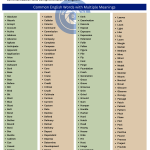Modal Verb Could Sentences
Modal verbs are a special class of verbs that add meaning to other verbs. They can express possibility, necessity, permission, ability, or obligation. One of the most common modal verbs is “could.”
“Could” is used to express a variety of things:
- Ability: I could speak English when I was five years old.
- Possibility: It could rain today.
- Permission: Could I use your phone?
- Requests: Could you help me with this?
- Suggestions: We could go to the movies tonight.
Here are 100+ sentences using the modal verb “could”:
Possibility:
- I could visit you later.
- She could come to the party.
- He could solve the puzzle.
- They could win the competition.
- You could find the answer online.
- We could go for a walk.
- It could rain tomorrow.
- She could buy a new car.
- He could discover a hidden talent.
- They could make a difference in the world.
Permission:
- Could I borrow your pen?
- She could use the computer.
- He could enter the building.
- They could attend the meeting.
- You could take a day off.
- We could have a discussion.
- It could be open to the public.
- She could bring her dog.
- He could join us for dinner.
- They could take photographs.
Polite Request:
- Could you please pass the salt?
- She could help with the project.
- He could send me the report.
- They could lend me some money.
- We could have a meeting tomorrow.
- Could you give me a hand?
- She could call me later.
- He could email the details.
- They could join us for dinner.
- We could discuss this further.
Ability:
- I could swim when I was five.
- She could play the violin.
- He could speak Chinese fluently.
- They could run a marathon.
- You could solve complex problems.
- We could dance gracefully.
- It could be a challenging task.
- She could cook delicious meals.
- He could paint beautiful landscapes.
- They could program computers.
Past Ability:
- I could speak French in high school.
- She could swim before she turned three.
- He could run faster when he was younger.
- They could climb that tree as kids.
- You could play the piano as a teenager.
- We could ride bikes without training wheels.
- It could be a great memory.
- She could solve math problems at 10.
- He could paint in his early years.
- They could program games in college.
Suggestion:
- You could try the new restaurant in town.
- She could explore new hobbies.
- He could learn a musical instrument.
- They could visit the art museum.
- We could take a vacation together.
- I could start a new book.
- You could watch a documentary.
- She could go for a walk.
- He could take a cooking class.
- They could join a sports club.
Prohibition:
- You could not smoke in this area.
- She could not enter without an ID.
- He could not park here.
- They could not access the restricted area.
- We could not use cell phones during the meeting.
- I could not bring outside food.
- You could not leave your bags unattended.
- She could not take pictures in the museum.
- He could not skip the queue.
- They could not speak loudly in the library.
Obligation:
- I could not miss the deadline.
- She could not forget to sign the contract.
- He could not neglect his responsibilities.
- They could not avoid the meeting.
- We could not ignore the rules.
- You could not escape your duties.
- She could not abandon her duties.
- He could not neglect his health.
- They could not disregard safety protocols.
- I could not delay this any longer.
Certainty:
- I could assure you it will work.
- She could guarantee a successful outcome.
- He could confirm the reservation.
- They could promise to deliver on time.
- We could vouch for his integrity.
- You could trust our expertise.
- She could affirm the accuracy of the data.
- He could certify the authenticity.
- They could verify the information.
- I could confirm your booking.
Hypothetical:
- If you practice more, you could improve.
- She could achieve her goals with determination.
- He could solve the problem if he tries.
- They could reach their dreams through hard work.
- We could overcome any obstacle.
- You could create a better future.
- If she believes in herself, she could succeed.
- He could become a leader with the right skills.
- They could change the world with their ideas.
- If you never give up, you could achieve anything.

Modal verb “could” sentences are an important part of the English language. They allow us to express a wide range of ideas and emotions in a clear and concise way. By understanding how to use “could” sentences correctly, we can improve our writing and speaking skills.





